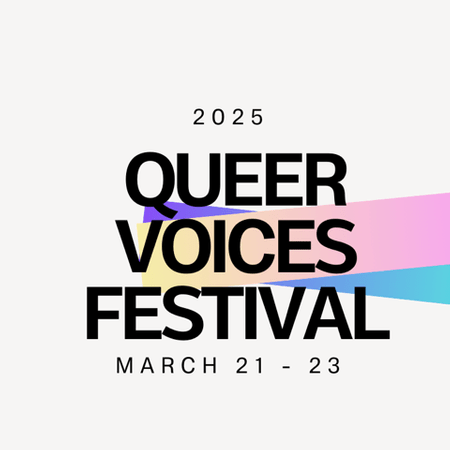
The Queer Voices Festival
Presented by Boston Theater Company
The Balcony or The Last Night by Pascale Florestal, she/her/hers
Halftime v. Intermission by Michael J. Bobbitt, he/him
Left Overs by Roni Ragone, they/them
Limpia by Leonard P. Madrid, he/him
Oop, Can’t Say That by Tom Zhang, they/them
Seance by Dylan Horowitz, He/Him & She/Her
Zelda by Haz Cady, he/him
March 21 -23, 2025
Boston Center for the Arts
539 Tremont St
Boston, MA 02116
2 Hrs 15 Minutes with 1 intermission
Review by Helen Ganley
BOSTON — This past weekend, the Boston Theater Company hosted its 2nd annual Queer Voices Festival at the Boston Center for the Arts. We are caught in an onslaught of voices, opinions, and legislation—the whipping wind of oppression slapping us in the face, the ice of hatred hardening on the sidewalk, daring us to fall. This event gathers a community under the umbrella of representation, shielding them—if only for an hour and a half—from the deluge outside.
Launched in March 2024, the Queer Voices Festival is an annual celebration dedicated to amplifying LGBTQ+ narratives through the performing arts. It provides a platform for underrepresented voices, challenges societal norms, and carves out space for diverse storytelling. The festival features not only theatrical performances but also opening acts, staged readings, queer-themed Shakespeare adaptations, and lively cabaret shows, ensuring engagement for audiences of all ages. By fostering inclusivity and representation, the festival doesn’t just entertain—it sparks dialogue and encourages acceptance within the arts community.
The festival’s pieces are distinct and inspiring, each one crafted by a unique combination of playwright, director, and two to three actors. Together, they form a series of interwoven vignettes, overlapping in theme (and occasionally in cast and crew), transitioning seamlessly from one to the next.
Exploring transgender representation in the media, Oop, Can’t Say That, written by Tom Zhang, follows Suzy (Jiayi Shao) as they attempt to give a talk on being an Asian-American transgender person. Hovering on the sidelines, two censors (Spencer McPhee and Ollie Rizzo) interrupt at every turn, deeming the words Asian and Trans too “pornographic” to be spoken aloud. The piece leans into its innate hypocrisy for comedy, but the sharp wordplay and analytical writing underscore the stark injustices of the present day. Similarly, Zelda, written by Haz Cady, examines storytelling and representation. David (Adam Boiselle) speaks to his therapist, Aurora Lee, following the death of his wife, Zelda (Taylor Corbett). Boiselle delivers a raw and heart-wrenching performance as David wrestles with whether to share that Zelda had transitioned before her passing.
Themes of death and grief permeate the festival. Left Overs, written by Roni Ragone, is a true standout. Ernest (Paul Dixon) and Max (Jamil Johnson) meet at their respective cemetery plots—Ernest at his son’s, Max at his father’s. Dixon’s performance is aloof yet weighted with sorrow, conversing with his son’s gravestone in an attempt to reconcile what was left unsaid. Johnson, snarky and sharp, serves as a counterweight to Dixon’s bereavement, their dynamic adding depth to the piece. In Seance, written by Dylan Reed Berman Horowitz, James (also played by Johnson) summons the spirit of his father into the body of his fiancé, Garth (Michael Yussef Greene). The piece inspires raucous laughter—the Freaky Friday-esque absurdity of a father possessing a lover’s body is inherently ridiculous—but at its core, it’s about the longing for those who have passed to truly know who is left behind.
Queer acceptance and expression, fittingly, are central to the festival’s intent. Limpia, written by Leonard P. Madrid, follows Ofelia (Zelina Estrella Garcia) and her Uncle Jaime (Johnny Gordon). Gordon’s performance is warm and spirited, contrasting Garcia’s subdued yearning for relief. The Balcony written by Pascale Florestal, captures the dreaded What are we? conversation, a staple of queer relationships.
Closing out the night, Michael J. Bobbitt’s Halftime v. Intermission was exceptional, delivering energy and humor through Juan Sepulveda’s melodramatic monologues and flippant asides. Though staged in a relatively sparse black box theater, each technical element enriches the minimalist worlds created onstage. Kaley Bennett’s props—whether a whiteboard or séance candles—allow performers to fully inhabit their spaces. Hope Debelius’s lighting casts gentle glows, seamlessly transitioning between pieces and spotlighting the actors in their most pivotal moments.
Finding representation can be difficult, but the Boston Theater Company’s Queer Voices Festival provides a space where all can be seen, heard, and understood. Amid the chaos of the world outside, the Boston Center for the Arts serves as a much-needed safe harbor.
